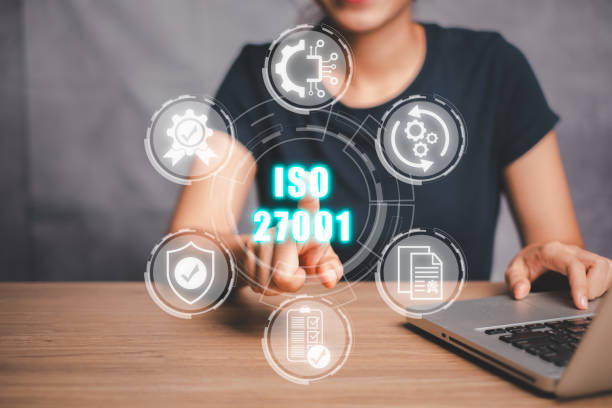I. Introduction to ISO 27001 Certification
A. The Importance of Information Security Management Systems (ISMS)
An Information Security Management System (ISMS) is vital for organizations that want to protect their sensitive information from a wide range of threats. As cyber threats continue to evolve, the need for a robust ISMS becomes increasingly crucial. Implementing an ISMS based on ISO 27001 not only helps organizations comply with legal and regulatory requirements but also builds trust with customers, partners, and stakeholders.It ensures that information security is integrated into the organization’s processes, reducing the likelihood of security incidents that could lead to financial losses, reputational damage, or legal repercussions.Additionally, an ISMS supports a proactive approach to information security, enabling organizations to identify and address potential risks before they escalate into significant issues.
II. Benefits of ISO 27001 Certification
A. Enhancing Data Security and Privacy
ISO 27001 certification plays a crucial role in strengthening an organization’s data security and privacy measures. By implementing a structured Information Security Management System (ISMS), organizations can systematically address potential vulnerabilities and protect sensitive information. This certification ensures that robust security protocols are in place, reducing the risk of data breaches and unauthorized access. The focus on continuous monitoring and improvement within ISO 27001 helps organizations stay ahead of evolving threats, providing a solid foundation for maintaining data integrity and privacy.
B. Building Trust with Customers and Stakeholders
Achieving ISO 27001 certification significantly enhances an organization’s credibility, fostering trust among customers, partners, and stakeholders. When a company is certified, it demonstrates a commitment to protecting sensitive information and adhering to stringent security standards. This assurance can be a key differentiator in competitive markets, where trust and transparency are essential. By aligning with internationally recognized security practices, organizations can strengthen relationships with stakeholders who prioritize data protection, ultimately leading to long-term business partnerships and customer loyalty.
III. ISO 27001 Certification and Incident Management
A. Developing an Effective Incident Response Plan
An effective incident response plan is crucial in managing and mitigating the risks associated with security breaches and other incidents. ISO 27001 emphasizes the importance of having a well-structured plan in place, which outlines clear procedures for identifying, assessing, and responding to security incidents. This plan should be tailored to the organization’s specific risks and needs, ensuring that all potential threats are considered. Regular updates and drills are also essential to keep the plan relevant and effective, allowing the organization to respond swiftly and efficiently when incidents occur.
B. How ISO 27001 Supports Incident Detection and Response
ISO 27001 provides a comprehensive framework for incident detection and response, helping organizations establish robust systems to monitor and manage security threats. By implementing ISO 27001, organizations can set up continuous monitoring processes that detect unusual activities or potential breaches in real-time. This proactive approach allows for quicker responses, minimizing damage and recovery time. Additionally, ISO 27001 promotes a culture of continuous improvement, encouraging organizations to learn from past incidents and enhance their response strategies over time. This ongoing refinement ensures that the organization remains resilient against emerging threats.
IV. ISO 27001 Certification and Cloud Security
A. Securing Cloud Environments with ISO 27001
Securing cloud environments is a critical aspect of modern information security management, and ISO 27001 provides a structured approach to achieving this. By adopting ISO 27001, organizations can implement rigorous controls to protect their cloud-based assets. This includes establishing clear policies for data protection, access control, and incident response specific to cloud environments. ISO 27001 helps organizations assess the security measures of their cloud service providers, ensuring that they meet the required standards for safeguarding sensitive information. It also emphasizes regular risk assessments and audits to identify and address potential vulnerabilities in the cloud infrastructure.
B. Best Practices for Cloud Security under ISO 27001
Implementing best practices for cloud security under ISO 27001 involves several key strategies. First, organizations should ensure that cloud service providers adhere to stringent security standards and conduct regular security assessments. Strong access controls must be in place to restrict unauthorized access to cloud resources, including multi-factor authentication and role-based access controls. Data encryption, both in transit and at rest, is essential to protect sensitive information from unauthorized access. Additionally, organizations should regularly review and update their security policies and procedures to reflect changes in technology and emerging threats. Continuous monitoring and logging of cloud activities are also crucial for detecting and responding to security incidents promptly. By following these practices, organizations can enhance their cloud security posture and align with ISO 27001 requirements.
V. ISO 27001 Certification and Incident Response Plans
A. Developing a Comprehensive Incident Response Plan
Creating a robust incident response plan is essential for managing and mitigating information security incidents. A well-developed plan outlines procedures for detecting, responding to, and recovering from security breaches or other incidents. It should include clearly defined roles and responsibilities, ensuring that all team members know their tasks during an incident. The plan should also detail communication protocols, both internal and external, to ensure timely and accurate information dissemination. Regularly testing the plan through simulations helps identify gaps and refine response strategies. By incorporating these elements, organizations can effectively manage incidents, minimize damage, and ensure a swift recovery.
B. Key Components of an Effective Incident Response Strategy
An effective incident response strategy comprises several critical components. First, it includes a well-defined incident response team, with roles assigned based on expertise and responsibilities. The strategy should also outline procedures for incident identification and classification, enabling quick assessment of the severity and impact. Communication plans are vital, detailing how information will be shared with stakeholders and regulatory bodies. Additionally, the strategy should include guidelines for containment, eradication, and recovery to address the incident’s root cause and restore normal operations. Documentation and post-incident analysis are essential for learning from the event and improving future responses. By incorporating these elements, organizations can enhance their ability to manage and recover from security incidents.
C. How ISO 27001 Certification Enhances Incident Management
ISO 27001 certification significantly strengthens incident management practices. The standard provides a structured framework for establishing and maintaining an Information Security Management System (ISMS) that includes comprehensive incident response protocols. Certification requires organizations to implement policies and procedures for identifying, reporting, and responding to incidents, ensuring that they are well-prepared for any security challenges. Regular audits and reviews, as mandated by ISO 27001, help organizations continuously improve their incident management processes. Additionally, the certification fosters a culture of security awareness and proactive risk management, which enhances overall incident handling capabilities. By adhering to ISO 27001, organizations can better manage incidents, reduce potential impacts, and improve their overall security posture.
VI. The Future of ISO 27001 Certification
A. Emerging Trends in Information Security Management
The landscape of information security management is rapidly evolving, influenced by advances in technology and shifts in global security threats. One notable trend is the increasing integration of artificial intelligence and machine learning into security practices. These technologies are enhancing threat detection and response capabilities, enabling organizations to identify and mitigate risks more efficiently. Additionally, the rise of cloud computing and remote work has shifted focus towards securing cloud environments and managing distributed systems.
B. The Evolving Role of ISO 27001 in Global Security Strategies
ISO 27001 is playing an increasingly pivotal role in shaping global security strategies. As organizations face more sophisticated cyber threats and stringent regulatory requirements, the certification provides a robust framework for managing information security. Its principles of risk assessment and continuous improvement are becoming essential for organizations aiming to safeguard sensitive information and maintain trust with stakeholders. The certification’s focus on integrating security management into business processes aligns with broader trends towards holistic and proactive security approaches. Furthermore, as international standards evolve to address new security challenges, ISO 27001 will continue to be a critical component of global security strategies, helping organizations navigate complex regulatory landscapes and maintain high standards of information protection.




